Assessment 1B: Applying Nursing Practice - Mrs. Hong Case Study
VerifiedAdded on 2023/01/05
|19
|3434
|83
Case Study
AI Summary
This case study presents the scenario of Mrs. Hong, a 70-year-old woman with stage 3C breast cancer and early dementia residing in a residential facility. The assignment requires an enrolled nurse to address various aspects of palliative care, including holistic care provision, documentation of patient wishes, personal values related to death and dying, scope of practice, physiological changes in a dying client, and the role of the multidisciplinary team. The questions delve into managing swallowing and breathing difficulties, caring for a malignant wound, identifying signs of deterioration, and providing comfort to an unconscious patient experiencing distress. The case study emphasizes the importance of providing emotional, spiritual, and practical support to both the patient and her family, considering the patient's cultural background and preferences. The assignment addresses the implementation of nursing interventions, pain management strategies, and the ethical considerations involved in end-of-life care, aligning with the NMBA Enrolled Nurse standards for practice and code of conduct.
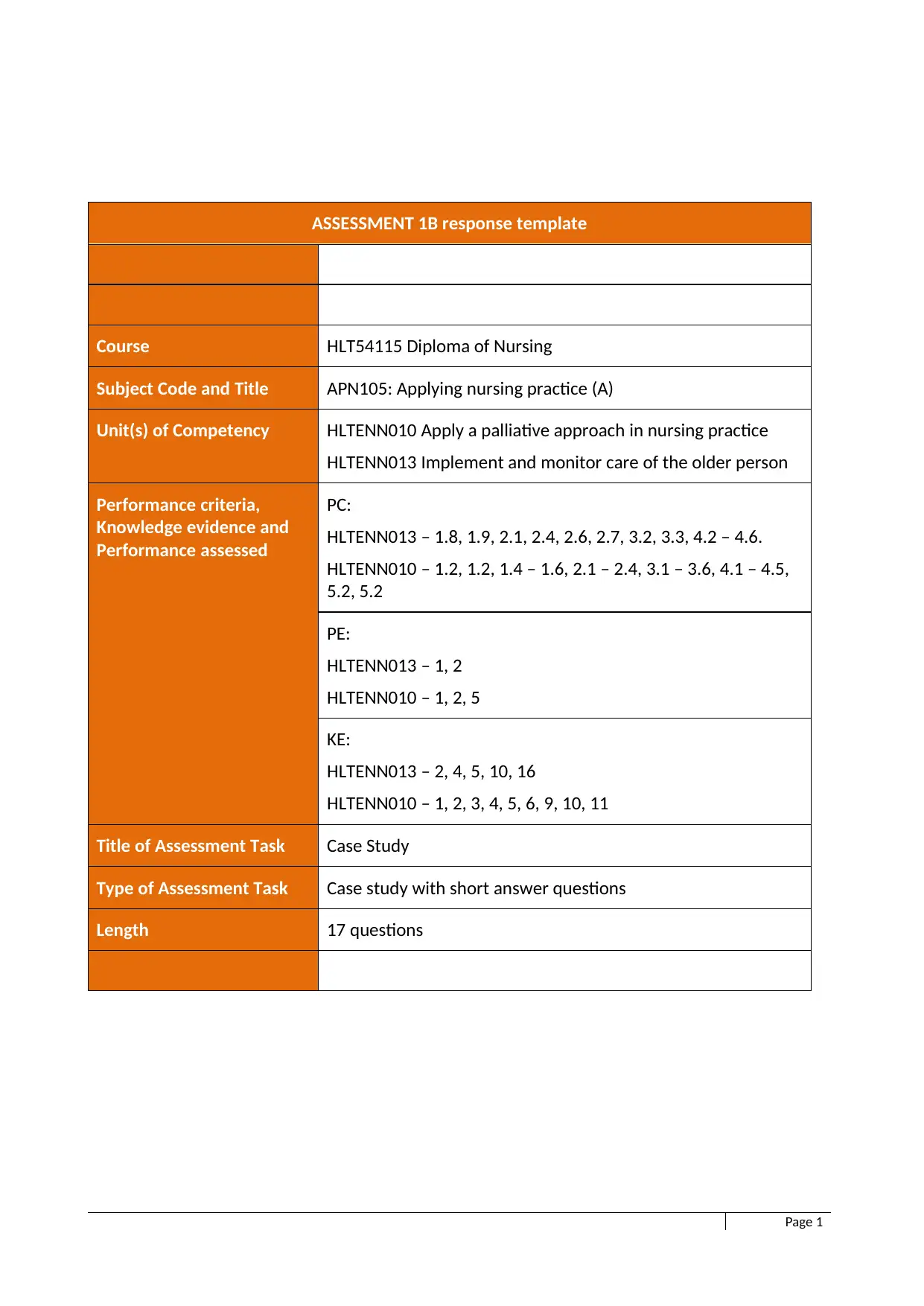
ASSESSMENT 1B response template
Course HLT54115 Diploma of Nursing
Subject Code and Title APN105: Applying nursing practice (A)
Unit(s) of Competency HLTENN010 Apply a palliative approach in nursing practice
HLTENN013 Implement and monitor care of the older person
Performance criteria,
Knowledge evidence and
Performance assessed
PC:
HLTENN013 – 1.8, 1.9, 2.1, 2.4, 2.6, 2.7, 3.2, 3.3, 4.2 – 4.6.
HLTENN010 – 1.2, 1.2, 1.4 – 1.6, 2.1 – 2.4, 3.1 – 3.6, 4.1 – 4.5,
5.2, 5.2
PE:
HLTENN013 – 1, 2
HLTENN010 – 1, 2, 5
KE:
HLTENN013 – 2, 4, 5, 10, 16
HLTENN010 – 1, 2, 3, 4, 5, 6, 9, 10, 11
Title of Assessment Task Case Study
Type of Assessment Task Case study with short answer questions
Length 17 questions
Page 1
Course HLT54115 Diploma of Nursing
Subject Code and Title APN105: Applying nursing practice (A)
Unit(s) of Competency HLTENN010 Apply a palliative approach in nursing practice
HLTENN013 Implement and monitor care of the older person
Performance criteria,
Knowledge evidence and
Performance assessed
PC:
HLTENN013 – 1.8, 1.9, 2.1, 2.4, 2.6, 2.7, 3.2, 3.3, 4.2 – 4.6.
HLTENN010 – 1.2, 1.2, 1.4 – 1.6, 2.1 – 2.4, 3.1 – 3.6, 4.1 – 4.5,
5.2, 5.2
PE:
HLTENN013 – 1, 2
HLTENN010 – 1, 2, 5
KE:
HLTENN013 – 2, 4, 5, 10, 16
HLTENN010 – 1, 2, 3, 4, 5, 6, 9, 10, 11
Title of Assessment Task Case Study
Type of Assessment Task Case study with short answer questions
Length 17 questions
Page 1
Paraphrase This Document
Need a fresh take? Get an instant paraphrase of this document with our AI Paraphraser
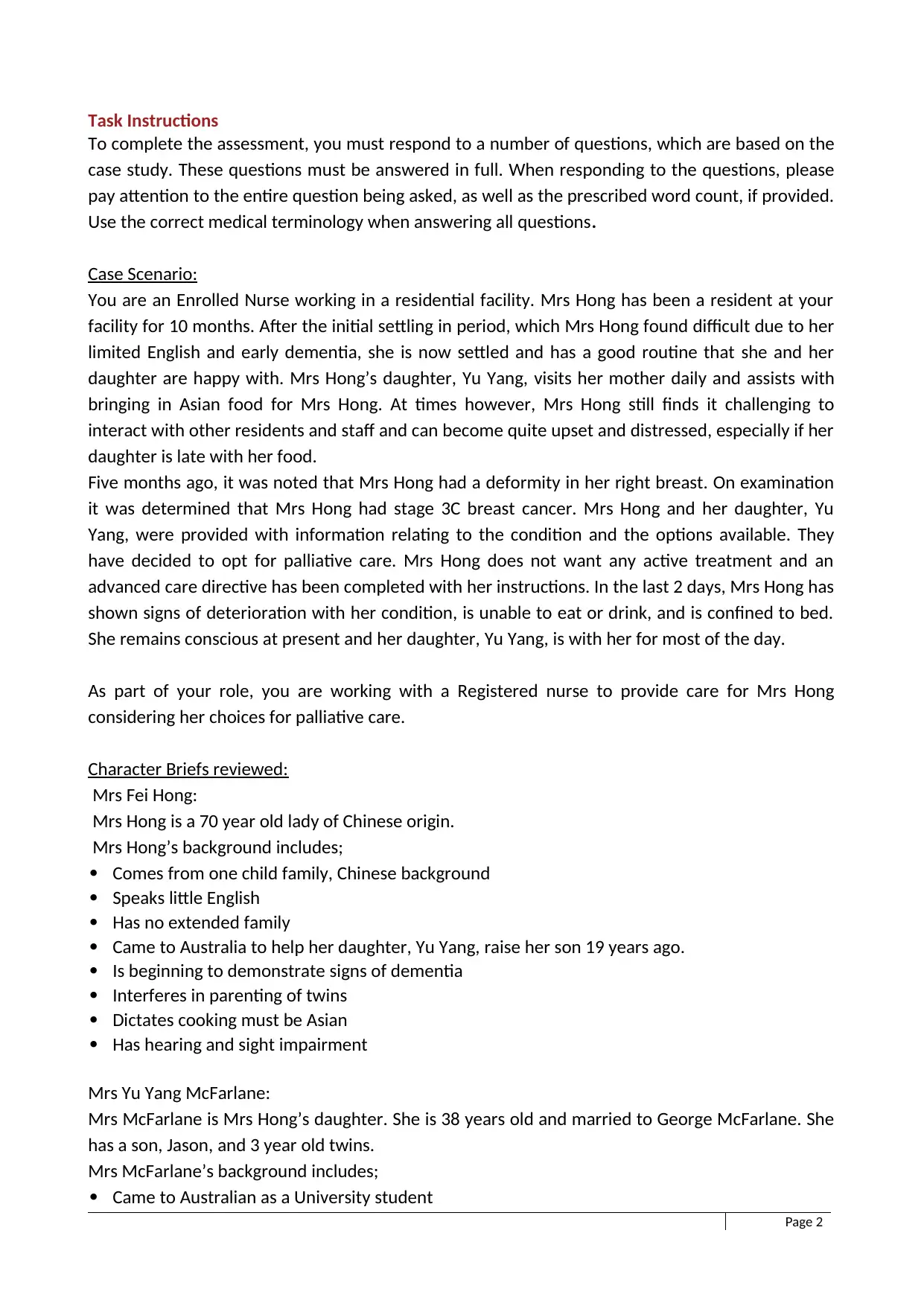
Task Instructions
To complete the assessment, you must respond to a number of questions, which are based on the
case study. These questions must be answered in full. When responding to the questions, please
pay attention to the entire question being asked, as well as the prescribed word count, if provided.
Use the correct medical terminology when answering all questions.
Case Scenario:
You are an Enrolled Nurse working in a residential facility. Mrs Hong has been a resident at your
facility for 10 months. After the initial settling in period, which Mrs Hong found difficult due to her
limited English and early dementia, she is now settled and has a good routine that she and her
daughter are happy with. Mrs Hong’s daughter, Yu Yang, visits her mother daily and assists with
bringing in Asian food for Mrs Hong. At times however, Mrs Hong still finds it challenging to
interact with other residents and staff and can become quite upset and distressed, especially if her
daughter is late with her food.
Five months ago, it was noted that Mrs Hong had a deformity in her right breast. On examination
it was determined that Mrs Hong had stage 3C breast cancer. Mrs Hong and her daughter, Yu
Yang, were provided with information relating to the condition and the options available. They
have decided to opt for palliative care. Mrs Hong does not want any active treatment and an
advanced care directive has been completed with her instructions. In the last 2 days, Mrs Hong has
shown signs of deterioration with her condition, is unable to eat or drink, and is confined to bed.
She remains conscious at present and her daughter, Yu Yang, is with her for most of the day.
As part of your role, you are working with a Registered nurse to provide care for Mrs Hong
considering her choices for palliative care.
Character Briefs reviewed:
Mrs Fei Hong:
Mrs Hong is a 70 year old lady of Chinese origin.
Mrs Hong’s background includes;
Comes from one child family, Chinese background
Speaks little English
Has no extended family
Came to Australia to help her daughter, Yu Yang, raise her son 19 years ago.
Is beginning to demonstrate signs of dementia
Interferes in parenting of twins
Dictates cooking must be Asian
Has hearing and sight impairment
Mrs Yu Yang McFarlane:
Mrs McFarlane is Mrs Hong’s daughter. She is 38 years old and married to George McFarlane. She
has a son, Jason, and 3 year old twins.
Mrs McFarlane’s background includes;
Came to Australian as a University student
Page 2
To complete the assessment, you must respond to a number of questions, which are based on the
case study. These questions must be answered in full. When responding to the questions, please
pay attention to the entire question being asked, as well as the prescribed word count, if provided.
Use the correct medical terminology when answering all questions.
Case Scenario:
You are an Enrolled Nurse working in a residential facility. Mrs Hong has been a resident at your
facility for 10 months. After the initial settling in period, which Mrs Hong found difficult due to her
limited English and early dementia, she is now settled and has a good routine that she and her
daughter are happy with. Mrs Hong’s daughter, Yu Yang, visits her mother daily and assists with
bringing in Asian food for Mrs Hong. At times however, Mrs Hong still finds it challenging to
interact with other residents and staff and can become quite upset and distressed, especially if her
daughter is late with her food.
Five months ago, it was noted that Mrs Hong had a deformity in her right breast. On examination
it was determined that Mrs Hong had stage 3C breast cancer. Mrs Hong and her daughter, Yu
Yang, were provided with information relating to the condition and the options available. They
have decided to opt for palliative care. Mrs Hong does not want any active treatment and an
advanced care directive has been completed with her instructions. In the last 2 days, Mrs Hong has
shown signs of deterioration with her condition, is unable to eat or drink, and is confined to bed.
She remains conscious at present and her daughter, Yu Yang, is with her for most of the day.
As part of your role, you are working with a Registered nurse to provide care for Mrs Hong
considering her choices for palliative care.
Character Briefs reviewed:
Mrs Fei Hong:
Mrs Hong is a 70 year old lady of Chinese origin.
Mrs Hong’s background includes;
Comes from one child family, Chinese background
Speaks little English
Has no extended family
Came to Australia to help her daughter, Yu Yang, raise her son 19 years ago.
Is beginning to demonstrate signs of dementia
Interferes in parenting of twins
Dictates cooking must be Asian
Has hearing and sight impairment
Mrs Yu Yang McFarlane:
Mrs McFarlane is Mrs Hong’s daughter. She is 38 years old and married to George McFarlane. She
has a son, Jason, and 3 year old twins.
Mrs McFarlane’s background includes;
Came to Australian as a University student
Page 2
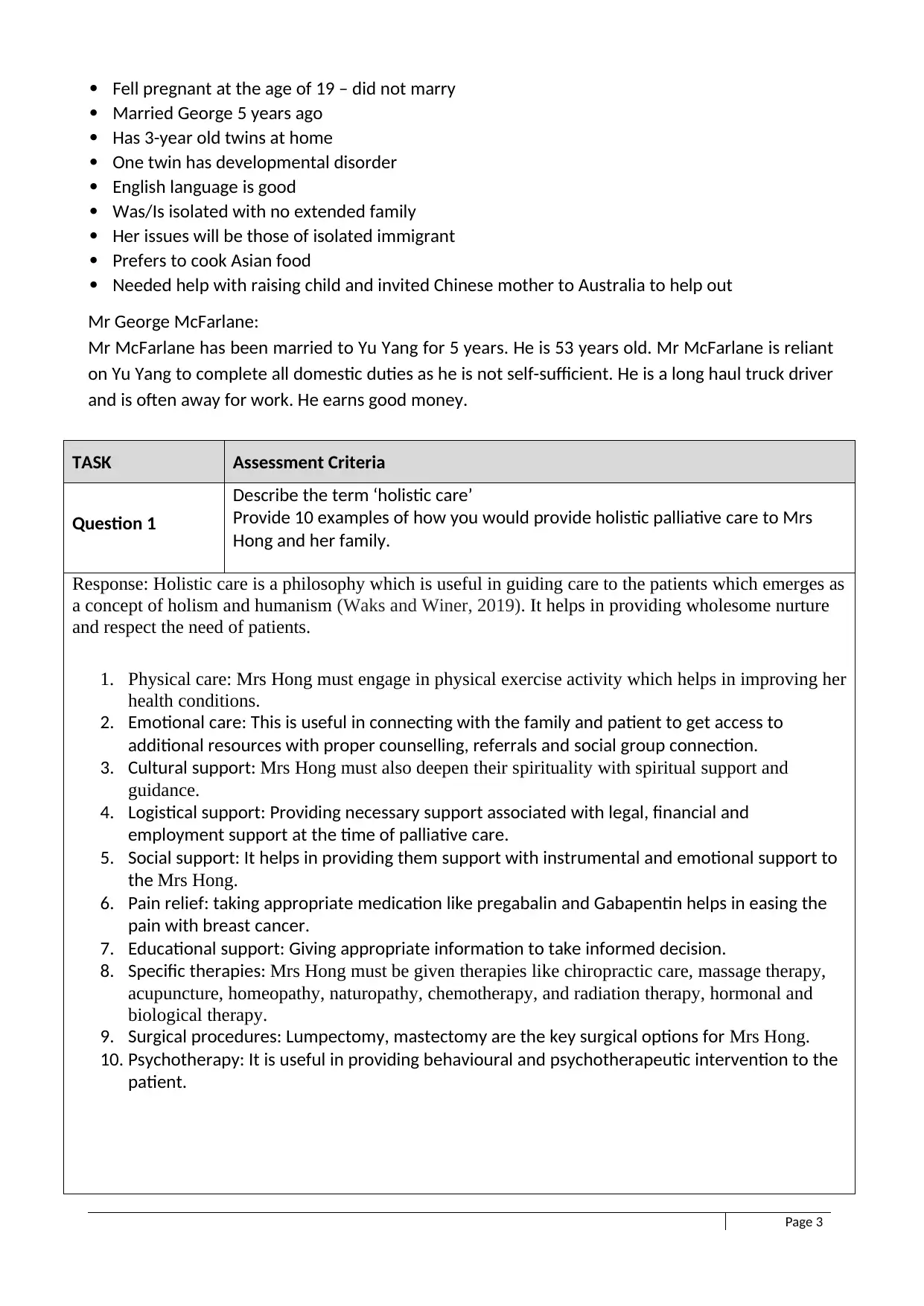
Fell pregnant at the age of 19 – did not marry
Married George 5 years ago
Has 3-year old twins at home
One twin has developmental disorder
English language is good
Was/Is isolated with no extended family
Her issues will be those of isolated immigrant
Prefers to cook Asian food
Needed help with raising child and invited Chinese mother to Australia to help out
Mr George McFarlane:
Mr McFarlane has been married to Yu Yang for 5 years. He is 53 years old. Mr McFarlane is reliant
on Yu Yang to complete all domestic duties as he is not self-sufficient. He is a long haul truck driver
and is often away for work. He earns good money.
TASK Assessment Criteria
Question 1
Describe the term ‘holistic care’
Provide 10 examples of how you would provide holistic palliative care to Mrs
Hong and her family.
Response: Holistic care is a philosophy which is useful in guiding care to the patients which emerges as
a concept of holism and humanism (Waks and Winer, 2019). It helps in providing wholesome nurture
and respect the need of patients.
1. Physical care: Mrs Hong must engage in physical exercise activity which helps in improving her
health conditions.
2. Emotional care: This is useful in connecting with the family and patient to get access to
additional resources with proper counselling, referrals and social group connection.
3. Cultural support: Mrs Hong must also deepen their spirituality with spiritual support and
guidance.
4. Logistical support: Providing necessary support associated with legal, financial and
employment support at the time of palliative care.
5. Social support: It helps in providing them support with instrumental and emotional support to
the Mrs Hong.
6. Pain relief: taking appropriate medication like pregabalin and Gabapentin helps in easing the
pain with breast cancer.
7. Educational support: Giving appropriate information to take informed decision.
8. Specific therapies: Mrs Hong must be given therapies like chiropractic care, massage therapy,
acupuncture, homeopathy, naturopathy, chemotherapy, and radiation therapy, hormonal and
biological therapy.
9. Surgical procedures: Lumpectomy, mastectomy are the key surgical options for Mrs Hong.
10. Psychotherapy: It is useful in providing behavioural and psychotherapeutic intervention to the
patient.
Page 3
Married George 5 years ago
Has 3-year old twins at home
One twin has developmental disorder
English language is good
Was/Is isolated with no extended family
Her issues will be those of isolated immigrant
Prefers to cook Asian food
Needed help with raising child and invited Chinese mother to Australia to help out
Mr George McFarlane:
Mr McFarlane has been married to Yu Yang for 5 years. He is 53 years old. Mr McFarlane is reliant
on Yu Yang to complete all domestic duties as he is not self-sufficient. He is a long haul truck driver
and is often away for work. He earns good money.
TASK Assessment Criteria
Question 1
Describe the term ‘holistic care’
Provide 10 examples of how you would provide holistic palliative care to Mrs
Hong and her family.
Response: Holistic care is a philosophy which is useful in guiding care to the patients which emerges as
a concept of holism and humanism (Waks and Winer, 2019). It helps in providing wholesome nurture
and respect the need of patients.
1. Physical care: Mrs Hong must engage in physical exercise activity which helps in improving her
health conditions.
2. Emotional care: This is useful in connecting with the family and patient to get access to
additional resources with proper counselling, referrals and social group connection.
3. Cultural support: Mrs Hong must also deepen their spirituality with spiritual support and
guidance.
4. Logistical support: Providing necessary support associated with legal, financial and
employment support at the time of palliative care.
5. Social support: It helps in providing them support with instrumental and emotional support to
the Mrs Hong.
6. Pain relief: taking appropriate medication like pregabalin and Gabapentin helps in easing the
pain with breast cancer.
7. Educational support: Giving appropriate information to take informed decision.
8. Specific therapies: Mrs Hong must be given therapies like chiropractic care, massage therapy,
acupuncture, homeopathy, naturopathy, chemotherapy, and radiation therapy, hormonal and
biological therapy.
9. Surgical procedures: Lumpectomy, mastectomy are the key surgical options for Mrs Hong.
10. Psychotherapy: It is useful in providing behavioural and psychotherapeutic intervention to the
patient.
Page 3
⊘ This is a preview!⊘
Do you want full access?
Subscribe today to unlock all pages.

Trusted by 1+ million students worldwide

Page 4
Paraphrase This Document
Need a fresh take? Get an instant paraphrase of this document with our AI Paraphraser
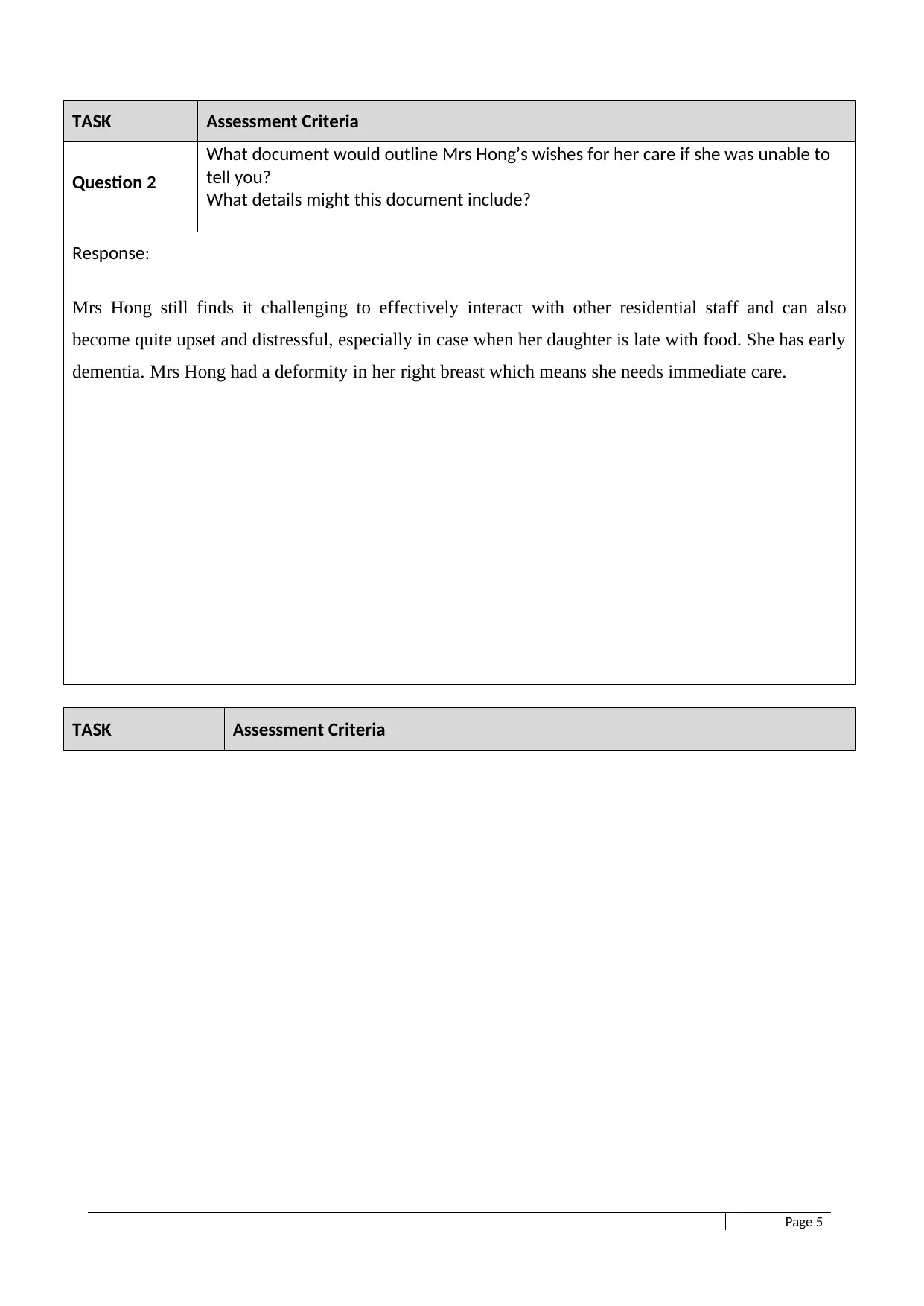
TASK Assessment Criteria
Question 2
What document would outline Mrs Hong’s wishes for her care if she was unable to
tell you?
What details might this document include?
Response:
Mrs Hong still finds it challenging to effectively interact with other residential staff and can also
become quite upset and distressful, especially in case when her daughter is late with food. She has early
dementia. Mrs Hong had a deformity in her right breast which means she needs immediate care.
TASK Assessment Criteria
Page 5
Question 2
What document would outline Mrs Hong’s wishes for her care if she was unable to
tell you?
What details might this document include?
Response:
Mrs Hong still finds it challenging to effectively interact with other residential staff and can also
become quite upset and distressful, especially in case when her daughter is late with food. She has early
dementia. Mrs Hong had a deformity in her right breast which means she needs immediate care.
TASK Assessment Criteria
Page 5
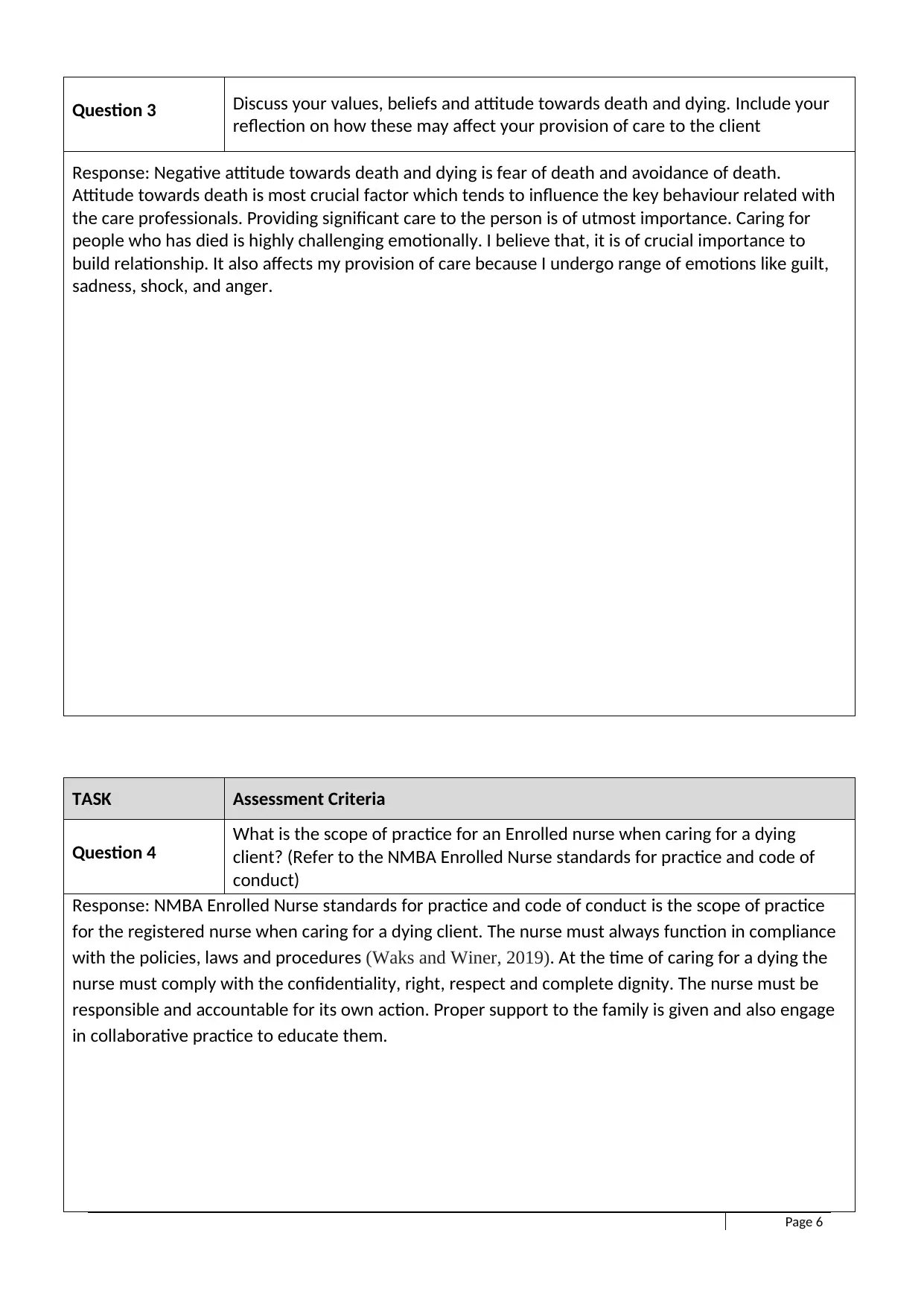
Question 3 Discuss your values, beliefs and attitude towards death and dying. Include your
reflection on how these may affect your provision of care to the client
Response: Negative attitude towards death and dying is fear of death and avoidance of death.
Attitude towards death is most crucial factor which tends to influence the key behaviour related with
the care professionals. Providing significant care to the person is of utmost importance. Caring for
people who has died is highly challenging emotionally. I believe that, it is of crucial importance to
build relationship. It also affects my provision of care because I undergo range of emotions like guilt,
sadness, shock, and anger.
TASK Assessment Criteria
Question 4 What is the scope of practice for an Enrolled nurse when caring for a dying
client? (Refer to the NMBA Enrolled Nurse standards for practice and code of
conduct)
Response: NMBA Enrolled Nurse standards for practice and code of conduct is the scope of practice
for the registered nurse when caring for a dying client. The nurse must always function in compliance
with the policies, laws and procedures (Waks and Winer, 2019). At the time of caring for a dying the
nurse must comply with the confidentiality, right, respect and complete dignity. The nurse must be
responsible and accountable for its own action. Proper support to the family is given and also engage
in collaborative practice to educate them.
Page 6
reflection on how these may affect your provision of care to the client
Response: Negative attitude towards death and dying is fear of death and avoidance of death.
Attitude towards death is most crucial factor which tends to influence the key behaviour related with
the care professionals. Providing significant care to the person is of utmost importance. Caring for
people who has died is highly challenging emotionally. I believe that, it is of crucial importance to
build relationship. It also affects my provision of care because I undergo range of emotions like guilt,
sadness, shock, and anger.
TASK Assessment Criteria
Question 4 What is the scope of practice for an Enrolled nurse when caring for a dying
client? (Refer to the NMBA Enrolled Nurse standards for practice and code of
conduct)
Response: NMBA Enrolled Nurse standards for practice and code of conduct is the scope of practice
for the registered nurse when caring for a dying client. The nurse must always function in compliance
with the policies, laws and procedures (Waks and Winer, 2019). At the time of caring for a dying the
nurse must comply with the confidentiality, right, respect and complete dignity. The nurse must be
responsible and accountable for its own action. Proper support to the family is given and also engage
in collaborative practice to educate them.
Page 6
⊘ This is a preview!⊘
Do you want full access?
Subscribe today to unlock all pages.

Trusted by 1+ million students worldwide
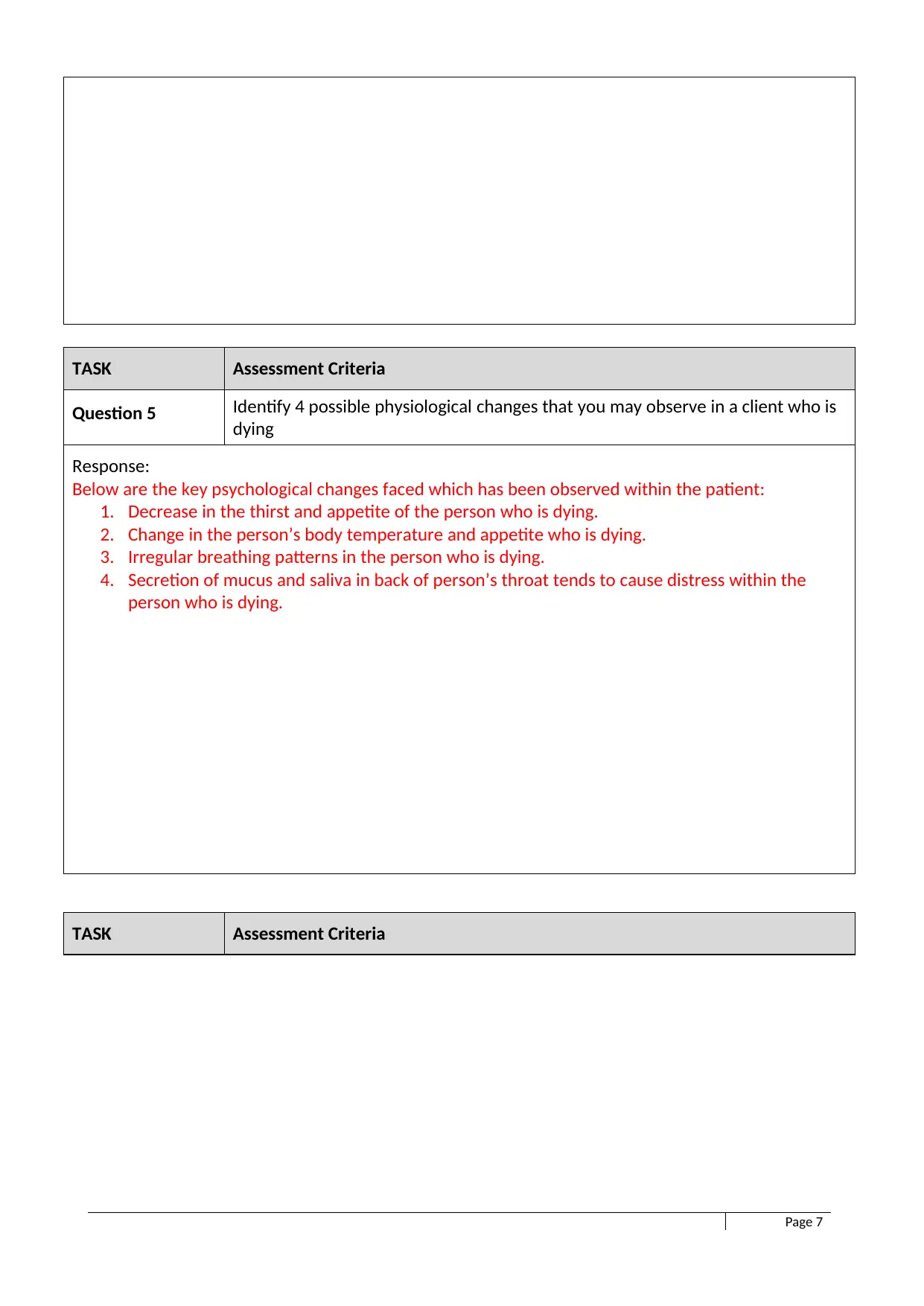
TASK Assessment Criteria
Question 5 Identify 4 possible physiological changes that you may observe in a client who is
dying
Response:
Below are the key psychological changes faced which has been observed within the patient:
1. Decrease in the thirst and appetite of the person who is dying.
2. Change in the person’s body temperature and appetite who is dying.
3. Irregular breathing patterns in the person who is dying.
4. Secretion of mucus and saliva in back of person’s throat tends to cause distress within the
person who is dying.
TASK Assessment Criteria
Page 7
Question 5 Identify 4 possible physiological changes that you may observe in a client who is
dying
Response:
Below are the key psychological changes faced which has been observed within the patient:
1. Decrease in the thirst and appetite of the person who is dying.
2. Change in the person’s body temperature and appetite who is dying.
3. Irregular breathing patterns in the person who is dying.
4. Secretion of mucus and saliva in back of person’s throat tends to cause distress within the
person who is dying.
TASK Assessment Criteria
Page 7
Paraphrase This Document
Need a fresh take? Get an instant paraphrase of this document with our AI Paraphraser
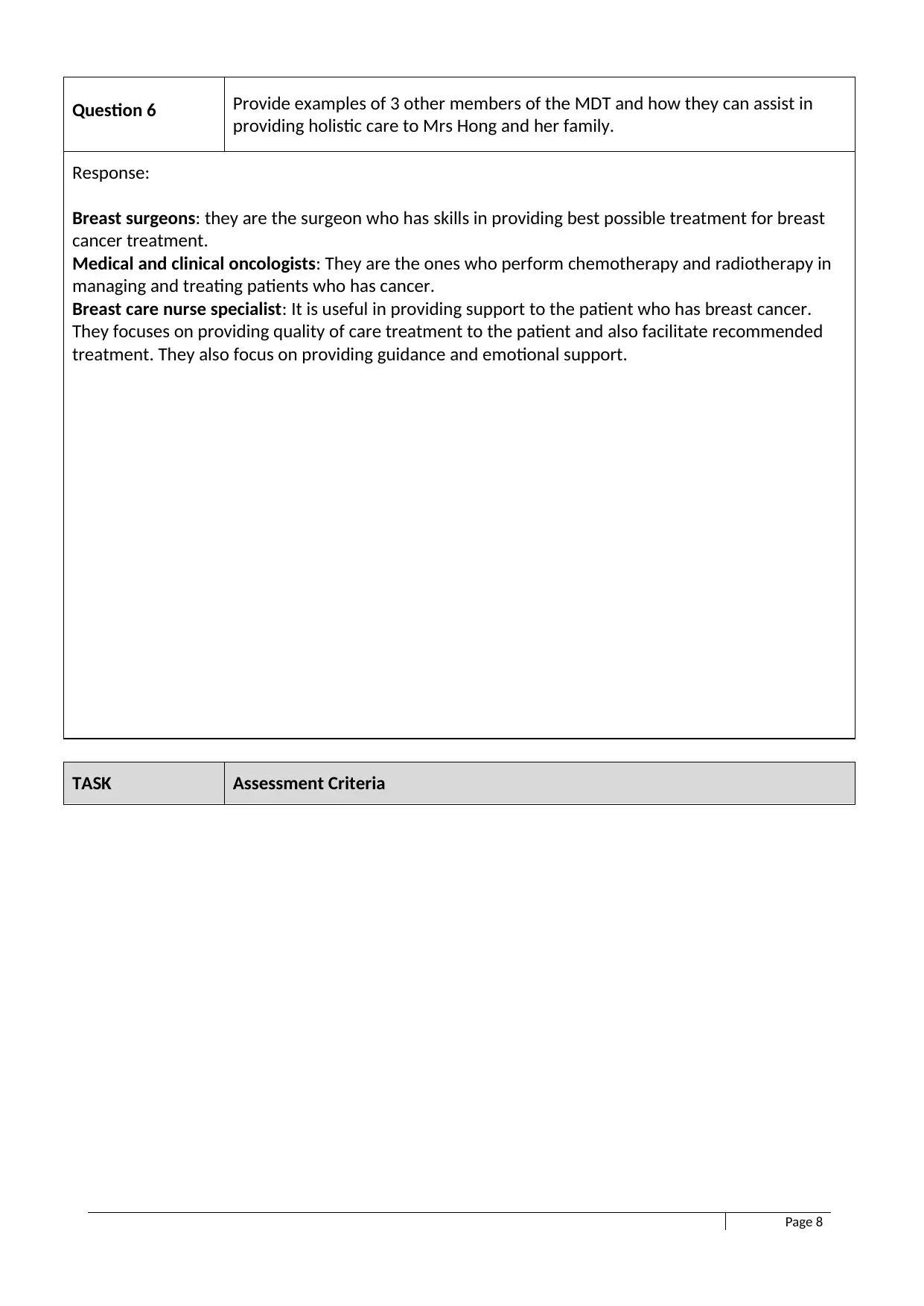
Question 6 Provide examples of 3 other members of the MDT and how they can assist in
providing holistic care to Mrs Hong and her family.
Response:
Breast surgeons: they are the surgeon who has skills in providing best possible treatment for breast
cancer treatment.
Medical and clinical oncologists: They are the ones who perform chemotherapy and radiotherapy in
managing and treating patients who has cancer.
Breast care nurse specialist: It is useful in providing support to the patient who has breast cancer.
They focuses on providing quality of care treatment to the patient and also facilitate recommended
treatment. They also focus on providing guidance and emotional support.
TASK Assessment Criteria
Page 8
providing holistic care to Mrs Hong and her family.
Response:
Breast surgeons: they are the surgeon who has skills in providing best possible treatment for breast
cancer treatment.
Medical and clinical oncologists: They are the ones who perform chemotherapy and radiotherapy in
managing and treating patients who has cancer.
Breast care nurse specialist: It is useful in providing support to the patient who has breast cancer.
They focuses on providing quality of care treatment to the patient and also facilitate recommended
treatment. They also focus on providing guidance and emotional support.
TASK Assessment Criteria
Page 8
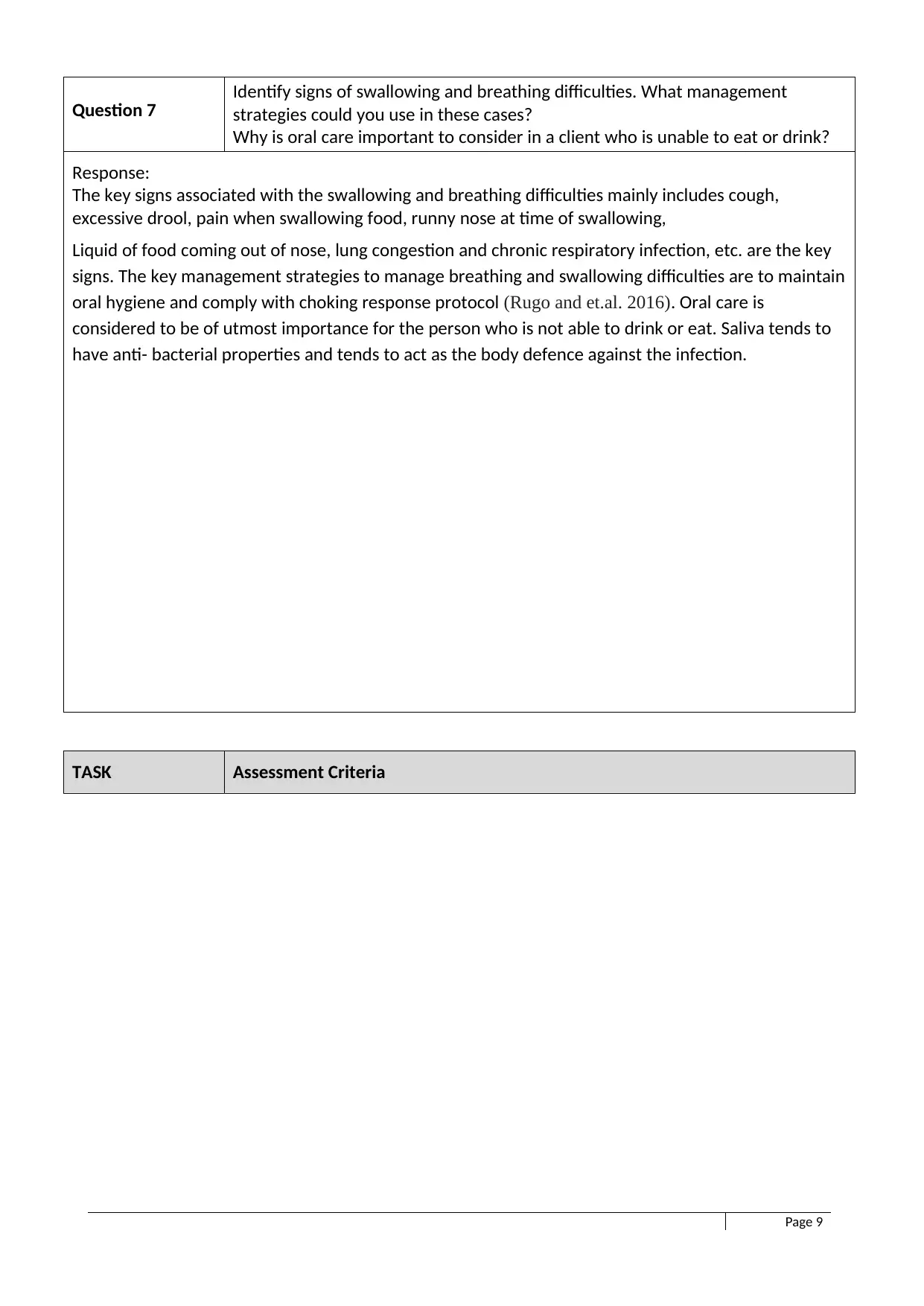
Question 7 Identify signs of swallowing and breathing difficulties. What management
strategies could you use in these cases?
Why is oral care important to consider in a client who is unable to eat or drink?
Response:
The key signs associated with the swallowing and breathing difficulties mainly includes cough,
excessive drool, pain when swallowing food, runny nose at time of swallowing,
Liquid of food coming out of nose, lung congestion and chronic respiratory infection, etc. are the key
signs. The key management strategies to manage breathing and swallowing difficulties are to maintain
oral hygiene and comply with choking response protocol (Rugo and et.al. 2016). Oral care is
considered to be of utmost importance for the person who is not able to drink or eat. Saliva tends to
have anti- bacterial properties and tends to act as the body defence against the infection.
TASK Assessment Criteria
Page 9
strategies could you use in these cases?
Why is oral care important to consider in a client who is unable to eat or drink?
Response:
The key signs associated with the swallowing and breathing difficulties mainly includes cough,
excessive drool, pain when swallowing food, runny nose at time of swallowing,
Liquid of food coming out of nose, lung congestion and chronic respiratory infection, etc. are the key
signs. The key management strategies to manage breathing and swallowing difficulties are to maintain
oral hygiene and comply with choking response protocol (Rugo and et.al. 2016). Oral care is
considered to be of utmost importance for the person who is not able to drink or eat. Saliva tends to
have anti- bacterial properties and tends to act as the body defence against the infection.
TASK Assessment Criteria
Page 9
⊘ This is a preview!⊘
Do you want full access?
Subscribe today to unlock all pages.

Trusted by 1+ million students worldwide
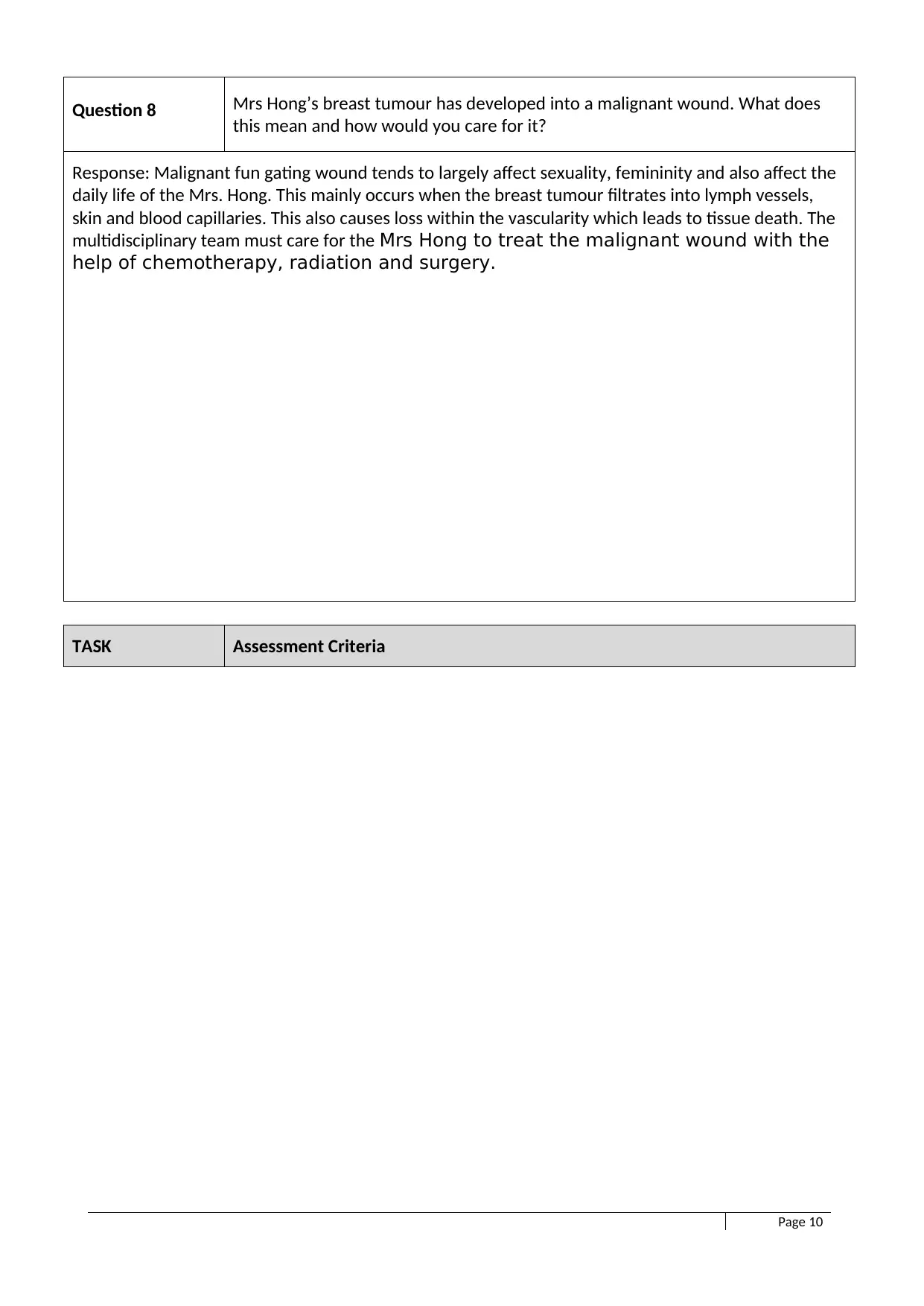
Question 8 Mrs Hong’s breast tumour has developed into a malignant wound. What does
this mean and how would you care for it?
Response: Malignant fun gating wound tends to largely affect sexuality, femininity and also affect the
daily life of the Mrs. Hong. This mainly occurs when the breast tumour filtrates into lymph vessels,
skin and blood capillaries. This also causes loss within the vascularity which leads to tissue death. The
multidisciplinary team must care for the Mrs Hong to treat the malignant wound with the
help of chemotherapy, radiation and surgery.
TASK Assessment Criteria
Page 10
this mean and how would you care for it?
Response: Malignant fun gating wound tends to largely affect sexuality, femininity and also affect the
daily life of the Mrs. Hong. This mainly occurs when the breast tumour filtrates into lymph vessels,
skin and blood capillaries. This also causes loss within the vascularity which leads to tissue death. The
multidisciplinary team must care for the Mrs Hong to treat the malignant wound with the
help of chemotherapy, radiation and surgery.
TASK Assessment Criteria
Page 10
Paraphrase This Document
Need a fresh take? Get an instant paraphrase of this document with our AI Paraphraser
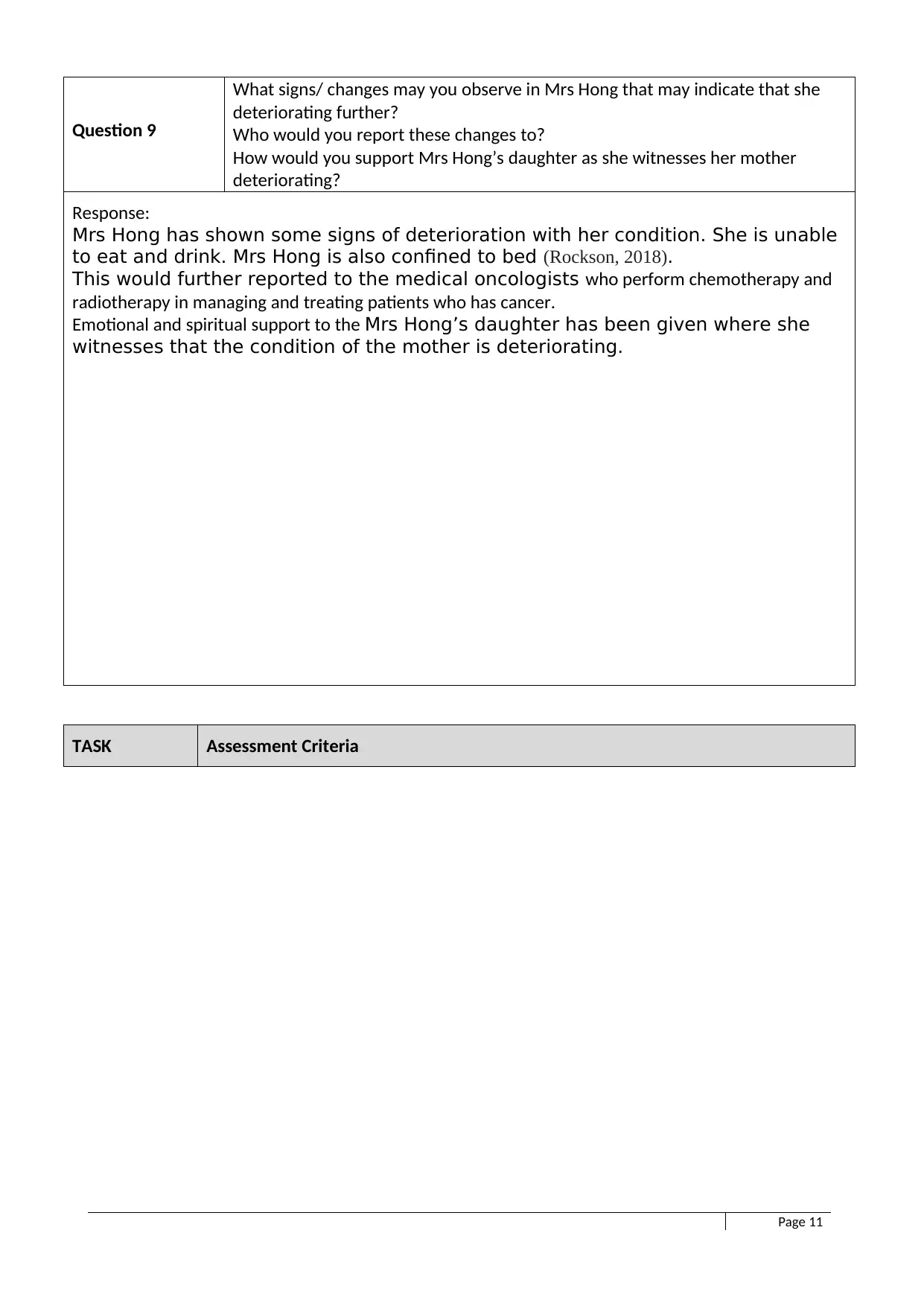
Question 9
What signs/ changes may you observe in Mrs Hong that may indicate that she
deteriorating further?
Who would you report these changes to?
How would you support Mrs Hong’s daughter as she witnesses her mother
deteriorating?
Response:
Mrs Hong has shown some signs of deterioration with her condition. She is unable
to eat and drink. Mrs Hong is also confined to bed (Rockson, 2018).
This would further reported to the medical oncologists who perform chemotherapy and
radiotherapy in managing and treating patients who has cancer.
Emotional and spiritual support to the Mrs Hong’s daughter has been given where she
witnesses that the condition of the mother is deteriorating.
TASK Assessment Criteria
Page 11
What signs/ changes may you observe in Mrs Hong that may indicate that she
deteriorating further?
Who would you report these changes to?
How would you support Mrs Hong’s daughter as she witnesses her mother
deteriorating?
Response:
Mrs Hong has shown some signs of deterioration with her condition. She is unable
to eat and drink. Mrs Hong is also confined to bed (Rockson, 2018).
This would further reported to the medical oncologists who perform chemotherapy and
radiotherapy in managing and treating patients who has cancer.
Emotional and spiritual support to the Mrs Hong’s daughter has been given where she
witnesses that the condition of the mother is deteriorating.
TASK Assessment Criteria
Page 11
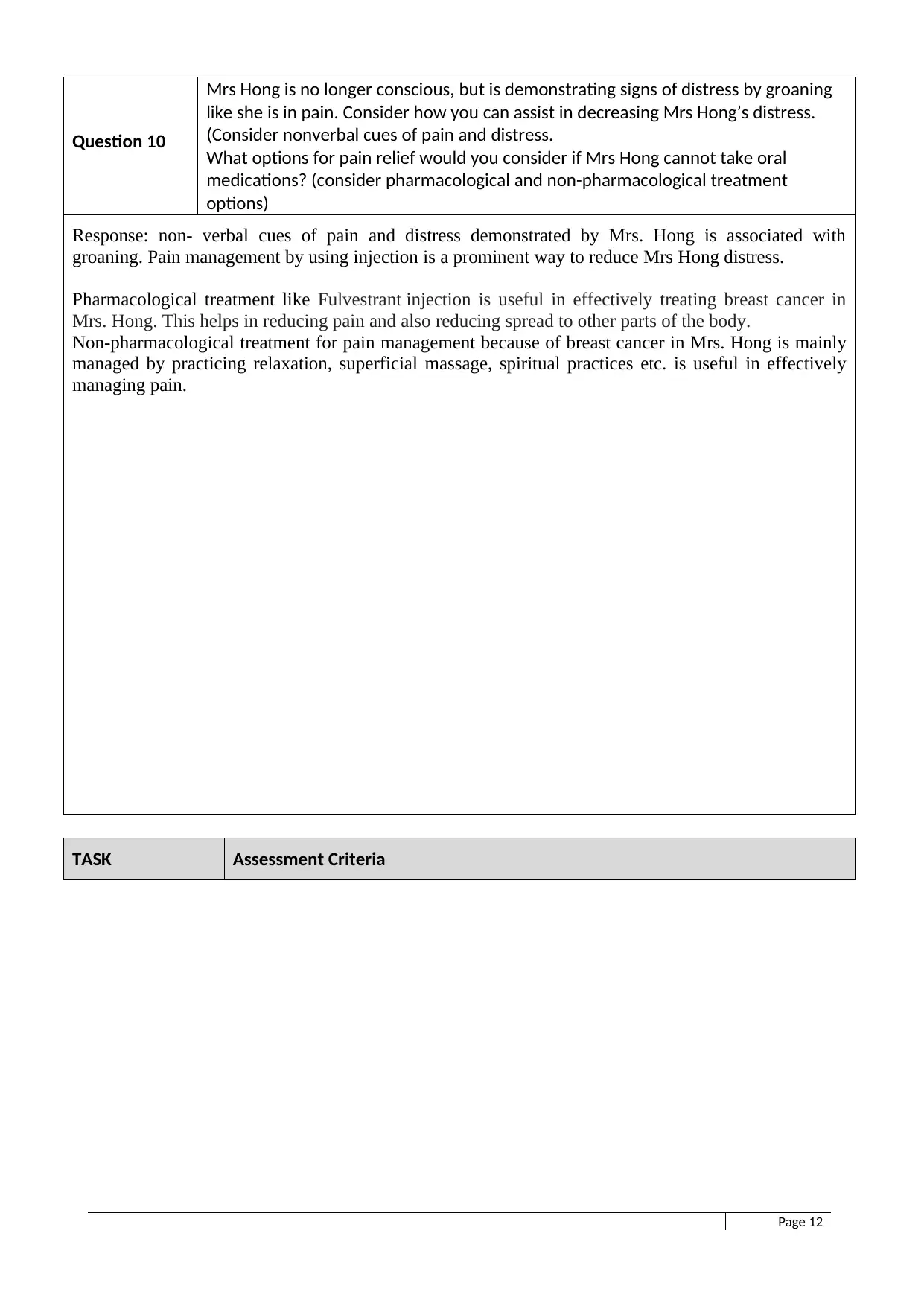
Question 10
Mrs Hong is no longer conscious, but is demonstrating signs of distress by groaning
like she is in pain. Consider how you can assist in decreasing Mrs Hong’s distress.
(Consider nonverbal cues of pain and distress.
What options for pain relief would you consider if Mrs Hong cannot take oral
medications? (consider pharmacological and non-pharmacological treatment
options)
Response: non- verbal cues of pain and distress demonstrated by Mrs. Hong is associated with
groaning. Pain management by using injection is a prominent way to reduce Mrs Hong distress.
Pharmacological treatment like Fulvestrant injection is useful in effectively treating breast cancer in
Mrs. Hong. This helps in reducing pain and also reducing spread to other parts of the body.
Non-pharmacological treatment for pain management because of breast cancer in Mrs. Hong is mainly
managed by practicing relaxation, superficial massage, spiritual practices etc. is useful in effectively
managing pain.
TASK Assessment Criteria
Page 12
Mrs Hong is no longer conscious, but is demonstrating signs of distress by groaning
like she is in pain. Consider how you can assist in decreasing Mrs Hong’s distress.
(Consider nonverbal cues of pain and distress.
What options for pain relief would you consider if Mrs Hong cannot take oral
medications? (consider pharmacological and non-pharmacological treatment
options)
Response: non- verbal cues of pain and distress demonstrated by Mrs. Hong is associated with
groaning. Pain management by using injection is a prominent way to reduce Mrs Hong distress.
Pharmacological treatment like Fulvestrant injection is useful in effectively treating breast cancer in
Mrs. Hong. This helps in reducing pain and also reducing spread to other parts of the body.
Non-pharmacological treatment for pain management because of breast cancer in Mrs. Hong is mainly
managed by practicing relaxation, superficial massage, spiritual practices etc. is useful in effectively
managing pain.
TASK Assessment Criteria
Page 12
⊘ This is a preview!⊘
Do you want full access?
Subscribe today to unlock all pages.

Trusted by 1+ million students worldwide
1 out of 19
Related Documents
Your All-in-One AI-Powered Toolkit for Academic Success.
+13062052269
info@desklib.com
Available 24*7 on WhatsApp / Email
![[object Object]](/_next/static/media/star-bottom.7253800d.svg)
Unlock your academic potential
Copyright © 2020–2026 A2Z Services. All Rights Reserved. Developed and managed by ZUCOL.





